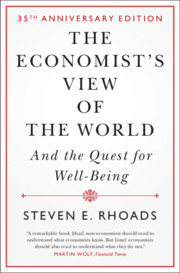Book contents
- More Praise for The Economist’s View of the World
- The Economist’s View of the World
- The Economist’s View of the World
- Copyright page
- Dedication
- Contents
- Preface
- Acknowledgments to the First Edition
- Acknowledgments
- Introduction
- Part I Useful Concepts
- 1 Opportunity Cost
- 2 Marginalism
- 3 Economic Incentives
- Part II Government and Markets, Efficiency and Equity
- Part III The Limits of Economics
- Notes
- Index
3 - Economic Incentives
from Part I - Useful Concepts
Published online by Cambridge University Press: 24 September 2021
- More Praise for The Economist’s View of the World
- The Economist’s View of the World
- The Economist’s View of the World
- Copyright page
- Dedication
- Contents
- Preface
- Acknowledgments to the First Edition
- Acknowledgments
- Introduction
- Part I Useful Concepts
- 1 Opportunity Cost
- 2 Marginalism
- 3 Economic Incentives
- Part II Government and Markets, Efficiency and Equity
- Part III The Limits of Economics
- Notes
- Index
Summary
Economists across the political spectrum agree that public policy can be improved by using incentives to achieve policy goals. In realms as disparate as lowering pollution and lessening traffic jams, economists have urged the use of market-like incentives such as taxes and fees to achieve public goals.
Many of today’s regulatory programs rely on detailed regulations to achieve their objectives. The Environmental Protection Agency, for instance, was tasked by Congress with regulating more than 200,000 plants that emit air pollutants. Economists have shown that using economic incentives, such as pollution and carbon taxes, would achieve cleaner air for a lower cost than reliance on regulations. Some studies have found that incentive-based schemes could achieve equivalent air quality for as little as 10 percent of the costs of existing methods. Similarly, in the large cities where they have been tried, variable tolls that rise with congestion have proved effective in lessening traffic jams and raising money to add lanes to crowded highways where necessary.
Despite the manifest economic benefits, pursuing public goals with incentives often meets public and political resistance.
Keywords
- Type
- Chapter
- Information
- The Economist's View of the WorldAnd the Quest for Well-Being, pp. 43 - 64Publisher: Cambridge University PressPrint publication year: 2021

